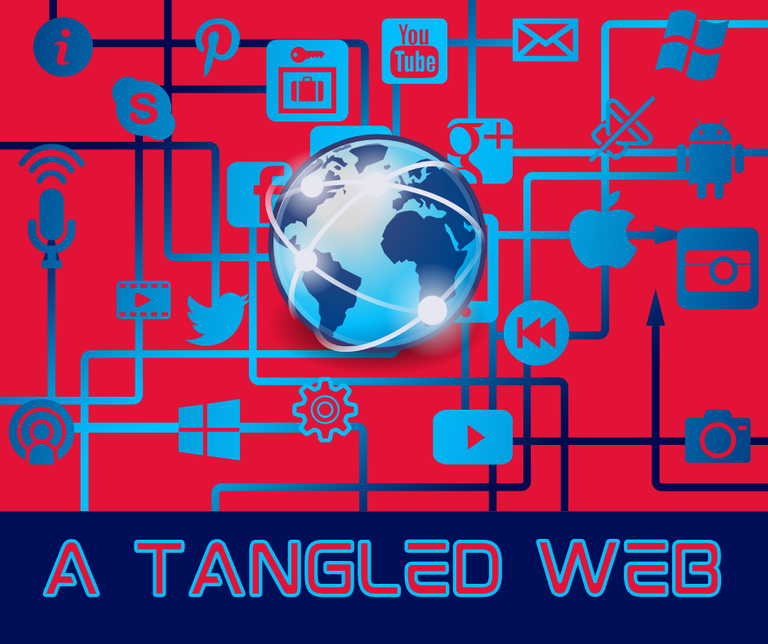What Does "Web 3.0" Mean, Anyway?
You may see people refer to HIVE as "Web 3.0," but what does that really mean? Does it even mean anything at all? Let's take a cursory (pun intended) look at the history of the internet to find out.

Image made in Canva
Pre-Web
The precursors to the modern internet were dial-up bulletin board systems (BBS), Usenet, and early networks involving government and academic institutions. Later web forums were an evolution of BBS. This era also saw the development of modern internet protocols. IRC still lingers even today.
Web 1.0
What we retroactively call "Web 1.0" was the early internet of individual websites. It began with the WorldWideWeb browser and HTML editor created by Tim Berners-Lee in 1991. It was released into the public domain in 1993. Mosaic and later Netscape Navigator also popularized the internet for home computer users. This era of the internet was known for myriad personal and corporate web pages.
This explosion of activity created the "Dot-Com Bubble" which made many millionaires overnight and left many more people broke. People strove to understand how to use this new communication system. Over-saturation of the market and speculation led to chaos, but it was overall a productive sort of chaos. Google, Amazon, eBay, PayPal, and other juggernauts emerged largely as a result of market competition and innovation. Netscape and Microsoft Internet Explorer battled online for market position in the "browser wars."
This was when I first got online. I was in the Netscape camp, and had a Juno free web e-mail account in the late 1990s. Web-connected computers allowed online gaming, but I didn't participate much in that arena. Web browsing was largely a matter of corporate websites and Yahoo searches. I suppose I have a sense of nostalgia of this era, but it had a lot of room for improvement.
Web 2.0
As websites and browsers both became more advanced, there was a gradual but definite shift. Broadband internet started to supplant dial-up for more and more people. Flash and Javascript expanded what pages could do. More websites wanted users to create accounts with logins and user names. There was more space for comments beyond simple guestbooks. People needed sites to store their photos and videos so it could be linked elsewhere. It was the rise of social media which was really hailed as "Web 2.0," though.
User-created content and what would later be known as "social networks" (with scare quotes included at first) changed the way people related to the internet. Chaos loomed again. MySpace came and went, as did several lesser-known sites. At first, this felt like a new way to connect with people and share new ideas. The internet brought far-flung family members into regular contact in a new way like we haven't seen since the telephone. There were more places to discuss ideas and debate opposing views. Smartphones also ensured everyone had internet access at their fingertips 24/7.
However, this system always had a sinister side, too. Identity theft, ransomware attacks, and abuses grew. People with poor internet security practices were especially vulnerable, but as more and more personal information was being entrusted to strangers, vulnerability grew for everyone. In addition, free speech means unsavory speech and outright abuse. Gore, child pornography, neo-Nazi hate, and other disgusting or outright criminal behavior also exploded. Backlash against such abuse meant the new social media corporate juggernauts had to respond. The result was a blend of human-directed censorship and automated moderation that threw out the baby with the bathwater, so to speak. Discussion of contentious topics like Canada's MAiD program is conflated with advocating self-harm, for one example from my own personal experience.
We are starting to see what may be the looming collapse of Twitter and Facebook. The former first showed major signs of strict censorship throughout the COVID pandemic and then going through the insanity of Elon Musk's acquisition with its revelations of systemic corruption. The latter is also seeing a declining user base, partly due no doubt to its own political and medical censorship, and partly due in my opinion to the explosion of advertisement and a decline in trust for their security and privacy policies.
Web 3.0?
In January 3rd, 2009, the Bitcoin genesis block was published by Satoshi Nakamoto. This was arguably the dawn of a new era. It's been another period of chaos as people innovated and iterated. Mt. Gox was the first major exchange collapse I recall, and government demanded more and more regulatory power over a system designed specifically to circumvent it. The Silk Road came and went as Ross Ulbricht sought to make black markets safer, and then the government cracked down.
Blockchains are the next step in internet evolution. Bitcoin has been imitated and forked uncountable times, and new technologies have been developed to improve aspects of it from the proof-of-work backbone to the anonymity of wallet holders. Like the dot com bubble, a lot of projects will go bust. Many people are selling hype instead of substance, but every crypto crash clears out some dead weight. While there is potential these upsets will drag down good projects, HIVE is in a strong position to withstand the pressure.
The State cannot stomach competition, but cryptography and non-government currencies are tools we can still use for real liberty. That is why there is so much more demand for control over something designed to be uncontrollable. The future of crypto will be determined by the projects that best resist censorship and regulatory impositions.
I believe blockchains are the next true evolution of the internet, but only time will tell whether I am right. Meanwhile, the bigwigs think this is the next development deserving the title of "web 3.0." We'll see.

Congratulations @jacobtothe! You have completed the following achievement on the Hive blockchain And have been rewarded with New badge(s)
Your next target is to reach 48000 upvotes.
You can view your badges on your board and compare yourself to others in the Ranking
If you no longer want to receive notifications, reply to this comment with the word
STOPTo support your work, I also upvoted your post!
Check out our last posts:
Indeed it does😎 and Hive still standing.
Wow that dial up modem handshake sound really brought back some otherworldly nostalgia feeling..
I was very little when I experienced that, and the sounds still clung to my ears the same way it did all those years back.. It's a eerie sound to say the least😂😂🔊🔊
!PIZZA
!LUV
I gifted $PIZZA slices here:
technicalside tipped jacobtothe (x1)
@yintercept(1/5) tipped @jacobtothe (x1)
Join us in Discord!
Web2.0 was a series of conventions held by O'Reilly media to sell books. The conference came after the dotcom bust.
The conferences used the name "Web2.0" to market to the companies that were still solvent after the undisciplined venture capital dried up.
There really was no new technology involved.
A large number of companies went under and we saw massive media consolidation.
The biggest problem of the early internet was the lack of a decent payment mechanism and decent authentication.
!PIZZA
Web 2.0 was much more of a gradual development of new technology and practices combined with marketing and press hype than a landmark change. The Bitcoin Genesis Block is another matter entirely.
Thank you for your witness vote!
Have a !BEER on me!
To Opt-Out of my witness beer program just comment STOP below
View or trade
BEER.Hey @yintercept, here is a little bit of
BEERfrom @isnochys for you. Enjoy it!Did you know that <a href='https://dcity.io/cityyou can use BEER at dCity game to buy cards to rule the world.
Hive is decentralized, and no one owns it, that's make it perfect for the tag of web 3, For me hive is keep growing and will be growing in the future with more dapps . My question is what we will call the technologies like Meta verse and chatgpt ? are they web 4.0 ?
The Metaverse is just a failure to expand "web 2.0" into virtual reality. AI is not really relevant to web development IMHO.
Most definitely. I ended up with lots of shite a few years back, luckily I also got Chainlink which offset the rubbish. I'm confident in Hive's long term fundamentals though and often think about turning it all into Hive and HBD and putting it to work. Web 3.0 is going go be huge within the next five years as it reaches critical mass in my opinion. We're in a fortunate place now here on Hive before the masses land.
Hi @jacobtothe
Excellent post, I agree with you, I think blockchains are the next evolution of the internet.
Certainly the future of cryptocurrencies will be conditioned by the resistance to regulations and censorship. That is why it is important to be aware of the regulations that each country imposes in relation to the use of cryptocurrencies in financial transactions.
While Paypal promotes disinformation and violates free speech rights of people. Use Bitcoin. Please add a fixed address or a BTC Pay link (which accepts lightning).